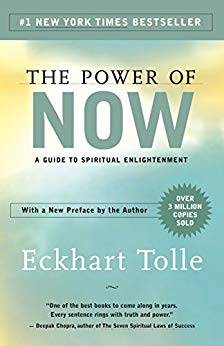

This article is an excerpt from the Shortform summary of "The Power of Now" by Eckhart Tolle. Shortform has the world's best summaries of books you should be reading.
Like this article? Sign up for a free trial here .
Do you feel like you always need to be in control? When events out of your control happen in your life, do you feel stressed and anxious? This is natural – but it might also not be the best way to live. Consider that surrendering might be a better path forward.
Many people have a negative connotation of surrender, associating it with passively tolerating a situation without taking further action. However, surrendering to the Now means to stop fighting the flow of life and to accept the reality of the Now; only then can you take productive, positive action forward.
Learn Eckhart Tolle’s surrender strategy, and how to practice it so you can live in the now.
The quick guide on how to surrender: In any undesirable situation you have three choices:
- Change the situation (if you can).
- Leave the situation (if you can).
- If you can’t do either of the above, accept it as it is.
Change or Leave the Situation
These first two options aren’t how to surrender since they involve action. Any action is typically better than none — either it improves the situation, or it is a mistake that you learn from, which is still ultimately benefiting you.
If you’re resisting taking action, ask yourself whether it’s out of fear. If so, observe the fear and be present with it; don’t judge or analyze it. Once you’ve acknowledged and accepted that fear, then you can decide your best next step.
There may be something you could do but aren’t doing, perhaps out of laziness. If this is the case, decide whether you are going to take action, or accept and embrace your laziness.
If you decide to continue on your course of inaction, you are better off committing fully to that choice than failing to act and then berating yourself or feeling guilty about it. This is the worst of both worlds – not only do you not make your situation better, you also don’t surrender. Making the choice not to act and then feeling bad about it is manufacturing a problem and creating unnecessary pain and negativity for yourself.
For example: If you are unhappy about your job, you can either change it (try to get a promotion or adjust your work duties), leave it (find a new job), or accept it as it is. In most cases, you probably have the option to change or leave your job. But if you don’t have the time, energy, or motivation to apply to new jobs or talk to your supervisor about making changes, then stop complaining about it. Going into work every day thinking about how much you hate your job only weighs you down with negativity.
How to Surrender: Accepting the Situation
If you can’t change or leave a situation, you may be forced to accept it forever, or at least until things change and you can take another action later. This is the essence of how to surrender.
If you are in an unpleasant or undesirable life situation, your first step is to acknowledge and accept the reality of this moment, because you can’t change what already exists in the Now.
If you resist or deny the reality of the present, you’re stuck wishing it were something else. That not only creates pain and negative energy (as we discussed earlier), but also prevents you from being able to move forward or make change.
If life gives you lemons, and you dwell on how you wish they were oranges, you’re still sitting there with a pile of lemons. If you accept that lemons are what you have to work with – in essence, surrendering to the lemons, you can use your energy to come up with things you can do with them — like lemon bars, lemon meringue pie, or, of course, lemonade.
Sometimes planning your next steps will be the only action you can take in the Now. If so, be careful not to get caught in mental projections of the future (psychological time). Instead of focusing on the myriad things you may have to do in the future, focus on the one thing you can do now, in each moment.
If there’s nothing you can do, think about how to surrender; accept it without resistance. Often you may find that circumstances change on their own, or as the book says, “Life becomes helpful and cooperative.” (This is comparable to the notion in The Alchemist that as you follow the call of the Universe, the Universe will help you on your path.)
Surrendering to Illness
We have explained why you must surrender to both the good and the bad in life in order to be present and access inner peace, but dealing with money problems or a job you don’t like is one thing. How do you accept extreme situations like chronic illness or suffering? Although the circumstances are more difficult, the process of how to surrender is essentially the same.
Like life problems, illness needs the context of past and future to exist. In each isolated moment of the Now, you only experience symptoms — physical pain, weakness, discomfort, or disability — not the entire illness. Accepting an illness can be overwhelming, but if you surrender to the existence of symptoms, you can be present and transform your experience.
Example: if you deal with chronic migraines, you can choose to experience your migraine one of two ways.
- You can think, “Again?! This could last hours! Now my whole afternoon will be lost. And this is my third migraine this month. What am I going to do with these awful migraines plaguing me all the time?”
- You can accept the present pain (and potentially temporary disability, in cases of extreme sensitivity to light and noise), and focus on breathing and getting through each moment. This is the path to how to surrender.
Per Eckhart Tolle, surrendering to the present won’t make the migraine go away, but it will alter your experience of it.
Do not surrender to the idea of illness or the identity of being sick. Since illness needs the context of past and future (otherwise it is reduced to symptoms), it engages your ego and takes you out of the present. Making an identity out of being sick does nothing to help you, it just keeps your focus on the unpleasantness and suffering.
Do not feel you’ve done anything wrong to cause your illness. Do not feel guilty for it, do not blame yourself. Also do not blame life for cursing you with it.
- Know that your illness has nothing to do with who you are. It does not define you in any way, despite what your ego tries to make you believe. Your true Being is unrelated to your physical body.
- If you were to wake up tomorrow and find you were completely blind, would it change who you are? It would certainly affect how you experience the world, but it would not change your true self.
If you find yourself feeling defensive or upset by this, reflect on whether you may have taken on this illness as part of your identity. If so, your ego may be reacting to this questioning of your supposed identity.
How to Surrender to Grief
Sometimes reality is so painful — like when you lose a loved one — that it’s too difficult to accept initially. But you always have two chances at surrender.
- You can surrender to the circumstances of the Now, because you can’t change what already is.
- If you can’t surrender to the external, surrender to the internal. Surrender to the pain, grief, sadness, fear, or loneliness you are feeling. Allow yourself to feel this way without judging, analyzing, or pitying yourself.
Once you recognize and accept these negative emotions, you are less likely to blindly act on them. Eckhart Tolle’s surrender has you recognize your state of being in a healthy way.
- However, at some point you will need to stop creating this negativity; otherwise, your acceptance just becomes indulgence that allows you to carry on in this mental pattern.
- Don’t use temporary escapes — such as work, drugs, sex, alcohol, food, shopping, or any other short-term pleasure — to avoid the pain. If you do, the pain will be waiting for you, possibly more intensely, when that pleasure fades.
When you have accepted suffering, you have indirectly accepted death. In death, only your ego and physical body cease to exist; the energy of your true Being can never be destroyed. When you can be present through suffering and understand that your true Being is really separate from your mind and body, you can then accept that this part of you is unaffected by what happens to the physical and mental parts of you.
You can use pain, illness, and suffering to push you deep into presence and enlightenment. Through extreme circumstances and pain, you may find yourself in a position where you have nowhere else to turn but inward to finally find peace and enlightenment. We’ll discuss this more later.
———End of Preview———

Like what you just read? Read the rest of the world's best summary of "The Power of Now" at Shortform . Learn the book's critical concepts in 20 minutes or less .
Here's what you'll find in our full The Power of Now summary :
- Why you feel pain from the past, and how to get rid of it
- How to be more present and stop worrying about the future
- The 8 key ways to achieve mindfulness






